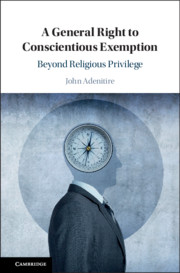Book contents
- A General Right to Conscientious Exemption
- A General Right to Conscientious Exemption
- Copyright page
- Contents
- Acknowledgements
- 1 Introduction
- 2 The General Right to Conscientious Exemption in US Law
- 3 The General Right to Conscientious Exemption in US Law: Beyond Religious Privilege?
- 4 The General Right to Conscientious Exemption in Canadian Law
- 5 The General Right to Conscientious Exemption in Canadian Law: Beyond Religious Privilege?
- 6 The General Right to Conscientious Exemption in UK Law
- 7 The General Right to Conscientious Exemption in UK Law: Beyond Religious Privilege?
- 8 The Liberal Model of Conscientious Exemptions
- 9 Balancing the General Right with Sexual Orientation Discrimination
- 10 Conclusion
- Index
2 - The General Right to Conscientious Exemption in US Law
Published online by Cambridge University Press: 27 July 2020
- A General Right to Conscientious Exemption
- A General Right to Conscientious Exemption
- Copyright page
- Contents
- Acknowledgements
- 1 Introduction
- 2 The General Right to Conscientious Exemption in US Law
- 3 The General Right to Conscientious Exemption in US Law: Beyond Religious Privilege?
- 4 The General Right to Conscientious Exemption in Canadian Law
- 5 The General Right to Conscientious Exemption in Canadian Law: Beyond Religious Privilege?
- 6 The General Right to Conscientious Exemption in UK Law
- 7 The General Right to Conscientious Exemption in UK Law: Beyond Religious Privilege?
- 8 The Liberal Model of Conscientious Exemptions
- 9 Balancing the General Right with Sexual Orientation Discrimination
- 10 Conclusion
- Index
Summary
This chapter investigates whether there is a general right to conscientious exemption in US law. The chapter concludes that there is, albeit its scope varies geographically. There are at least five rules of law which ground the right. These are: (1) the Free Exercise Clause of the First Amendment under federal constitutional law as interpreted by the USSC in Smith (albeit this is now very narrow), and the Free Exercise clauses of some state constitutions which did not interpret their own constitutions according to Smith; (2) The Religious Freedom Restoration Act (RFRA) which applies to the federal government and similar state legislation that applies in the states which have enacted them; (3) the Religious Land Use and Institutionalized Persons Act of 2000 (RLUIPA) which applies mainly to state governments in the context of land regulation, zoning laws and prisoners; (4) Title VII of the Civil Rights Act of 1964 (and similar state level legislation) which requires certain categories of employers to accommodate the religious beliefs of their employees in performing their employment duties; and (5) the constitutional requirements of Church Autonomy.
Keywords
- Type
- Chapter
- Information
- A General Right to Conscientious ExemptionBeyond Religious Privilege, pp. 20 - 46Publisher: Cambridge University PressPrint publication year: 2020

